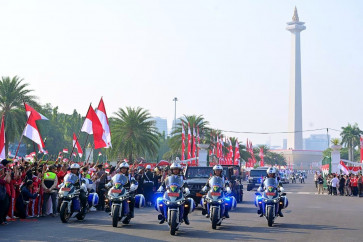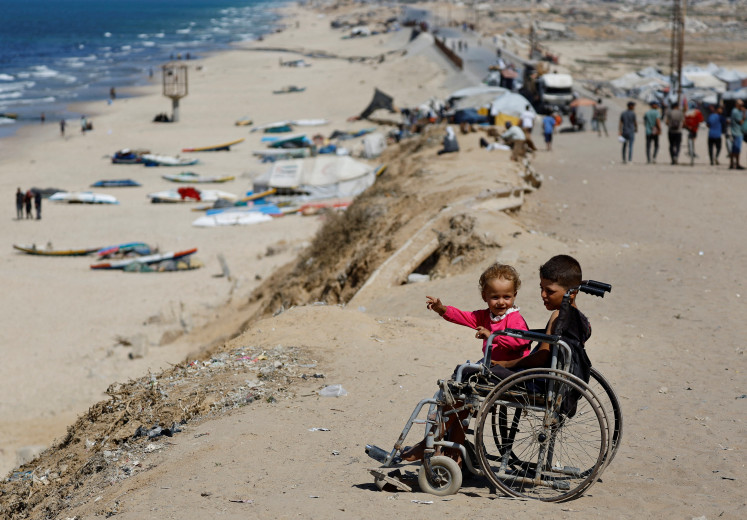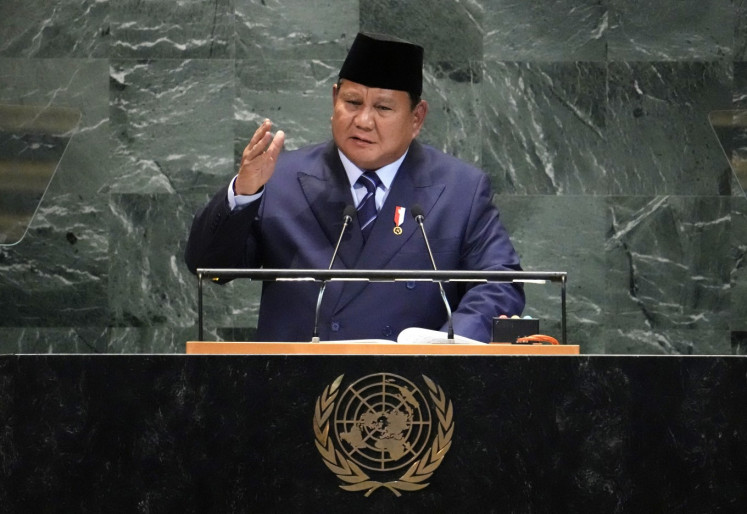Popular Reads
Top Results
Can't find what you're looking for?
View all search resultsPopular Reads
Top Results
Can't find what you're looking for?
View all search results‘Devout’ Dawam Rahardjo defended minorities
The news of the death of Dawam Rahardjo on Thursday, May 30, made me recall the time when I sat down with him for an interview when he was named the recipient of the Yap Thiam Hien Award for human rights in 2013
Change text size
Gift Premium Articles
to Anyone
T
he news of the death of Dawam Rahardjo on Thursday, May 30, made me recall the time when I sat down with him for an interview when he was named the recipient of the Yap Thiam Hien Award for human rights in 2013.
His thoughts as an Islamic intellectual are highly valuable to contemplate nowadays, particularly with the threat of extremist teachings leading to acts of terror in the country lately.
The professor was one of the first of a wave of Islamic intellectuals in the lively discourse on Islam since the 1970s, along with the late Nurcholish Madjid. He was long known as a multidimensional figure with various labels, both hailed and derailed as an economist, Islamic intellectual, humanist, Quranic encyclopedist, NGO activist, pluralist and a liberal.
His life reflected his struggle to defend pluralism in Indonesia. He consistently defended and accompanied threatened and oppressed minority groups. “That’s because I am a devout Muslim,” he said when asked about his attitude to mistreated minorities.
Dawam’s pluralist-liberal demeanor emerged when he was young. “Since my teenage years I have been hanging out with friends of other faiths. I even attended church services secretly, to understand other religions, without my parents knowing,” he said.
Dawam argued that Islam respects pluralism. This is reflected in a number of surah in the Quran, such as in Yunus (10): 25, which reads: “Surely Allah calls [on mankind] to al dar al salam [the domain of peace]. And Allah will guide believers on the straight path”.
A related verse on this “straight path” is found in An Nahl: “Show [man] to the way of your Lord with knowledge [and wisdom]. And have dialogue among you in a good way.” The basic argument of the verse according to Dawam is contained in Al Hujarat, which says, “Surely Allah created man composed of men and women, in groups and classes, in order to understand and appreciate each other [ta’aruf]“.
The verse contains an understanding of the existence of plurality or diversity in identity. Among different identities, people are encouraged to compete in creating good (fastabikhul khairat).
According to Dawam, to understand pluralism is not merely to give a contextual and historical interpretation of the Quranic texts that from the very beginning had liberal ideas.
That one should bow only to Allah instead of powerful rulers, for instance, was quite radical.
And interpreting the Quran contextually and liberally is not enough, he said, when it does not result in freedoms for religious minorities. Expecting the revelation of the Quran to be the solution of all problems of life is impossible if the mechanism of searching for the meaning of the text is usurped and subjugated into subjective reading.
Dawam explained the belief that the Quran is a solution to all life’s problems while ignoring various disciplines is a myth that must be dismantled.
He cited the tolerant attitude of the early nine propagators of Islam known as “Walisongo” when spreading Islam in the archipelago. According to him, when entering Indonesia, Islam was dealing with a very sophisticated culture as well as a strong power, namely the Majapahit kingdom.
But thanks to the open and tolerant attitude of the Walisongo, the spread of Islam occurred relatively smoothly through the acculturation and accommodation of the archipelago’s various cultures. “Even the Prophet [Muhammad’s] doctrine of revelation or sunnah entered through local cultural outlets, such as wayang or dance, so that [the teachings] could enter Indonesia smoothly,” Dawam said.
Dawam argues that in the Quran, Allah warns Prophet Muhammad against being rigid and tough, but that he must be gentle in approaching people. Rigid and hard attitudes will turn people away. If any Islamic group engages in violence against anyone, then Islam would be shunned. What Islamic leaders have to advocate is gentleness.
According to Dawam in Al Baqarah (2): 208, Allah said: “Come, the people, together into the path of peace [Islam] as a whole”. But contrary to common understanding, the translation should refer to the generic term Islam, which means peace, not al-Islam as an institutional religion.
As a generic term, Islam contains four meanings. First is the surrender to God. Second is to be safe and save mankind. Third is peace. Fourth is prosperity. That is why Muslims always say the greetings Assalamu’alaikum warahmatullah wabarakatuh which means “May salvation, peace and prosperity and the love of God be bestowed on you [all]”.
What Dawam believed to be the truth, especially on issues of pluralism and liberalism, exposed him to a torrent of insults and allegations of being a disbeliever and apostate.
“I know the risks I have to face,” he said. In perusing online comments on his works or actions, generally they charged him with blasphemy — and no one spoke up in his defense. But he remained calm and fearless.
Dawam maintained his persistence and determination in fighting for the diversity of people and groups in Indonesia. He strongly condemned the closing of places of worship and restrictions on worship of minority communities in Indonesia, and was involved in protests over unfair treatment directed against minorities.
For his humanitarian work in safeguarding and protecting the diversity of this nation, it was fitting that the professor was awarded the prestigious Yap Thiam Hien Award. Farewell, Pak Dawam. Thank you so much for your contribution.
__________________________
The writer is a news analyst at Binokular Media Utama. She previously worked for the Yap Thiam Hien Foundation.










